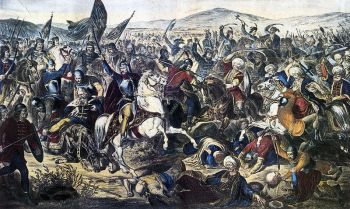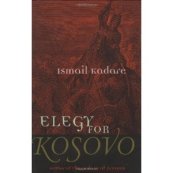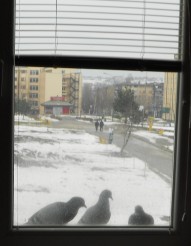February 25, 2012
In 1389, the Turkish army defeated the Serbian army at the Battle of Kosovo (Serbian spelling); blackbirds feasted on the carrion (Pettifer, James. Albania and Kosovo: Blue Guide, 3rded. New York: Norton, 2001, 309).
Albanian novelist Ismail Kadare focuses on this battle in his Elegy for Kosovo, where he recounts the long history of “the Serbs cursing the Albanians and the Albanians cursing the Serbs”; he also laments more than once that “we ourselves have brought this disaster on our heads, my brother! We have been fighting and slaughtering each other for so many years over Kosovo, and now Kosovo has fallen to others” (68).
The narrator, of course, refers to this fourteenth-century battle on the Plain of the Blackbirds (Elsie, Robert. A Dictionary of Albanian Religion, Mythology, and Folk Culture. NY: New York University Press, 2001, 122), but Kadare alludes to a struggle that has continued into his own time, as evinced in 1989, 600 years after the Ottomans crushed the Serbs, when Serbian leader Slobodan Milošević, standing on the same Field of the Blackbirds, urged Serbs to resist, with violence if necessary, what he called the Albanian aggression in Kosovo (Kearney, Philip. Under the Blue Flag: My Mission in Kosovo. Beverley Hills: Phoenix Books, 2008, 66-69).
In view of the parade and celebration here in Pristina on Friday, February 17—the fourth Independence Day for Kosova—I try not to despair over the vision painted by Kadare, especially because talks continue in Belgrade, where the Serbian government, hoping for EU status, inches toward recognizing the independence of Kosova, its former province. Still, I can’t shake Kadare’s elegiac mood, perhaps because Serbs living in northern Kosova just voted 97% against recognizing Kosova’s independence from Serbia, a vote that renders prophetic Edith Durham’s remark in High Albania over a century ago: “the real policy of Serb and Albanian should be to unite and keep the foreign intruders from the Balkan Peninsula. But this will never be” (276).
The poem below reflects this mood. Though it begins domestically, it ends on the same Field of Blackbirds, where it tries to honor both Albanians and Serbs and to lament their shared pain.
Pigeons and Blackbirds Each dawn they perch on my sill, grumbling and Gray, iced, unpreened, like old men swaddled in Great coats, huddled and waiting for spring. Then They spy my porch, littered with crusts, seeded And brown, manna torn from my loaf. Swooping Down, beaking the prize, they jack their tails and Strut like victors. Then blackbirds screech attack, Driving my guests from the feast, tearing the Bread like flesh they plucked from the Serbian Plain, then circled the Field for six hundred Years, ravenous still, always hot to gorge.




